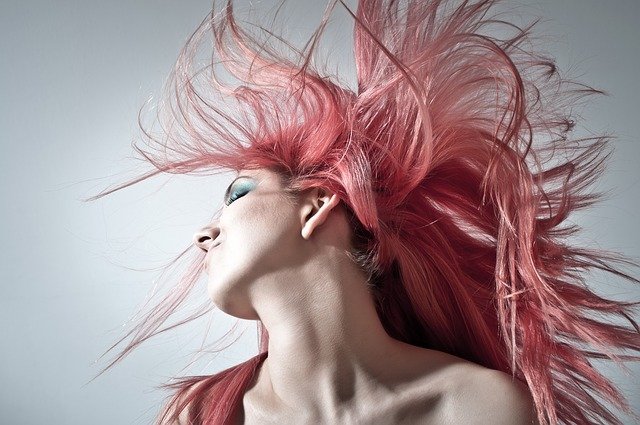You can enhance the health and appearance of thinning hair by choosing the right products and routines. Opt for thickening shampoos and volumizing conditioners without harsh chemicals to strengthen hair. Limit heat styling and embrace regular trims to prevent breakage. Scalp massages can stimulate follicle health, while maintaining a balanced diet supports overall hair strength. Protect your hair from sun damage and avoid tight hairstyles that cause stress to follicles. Seeking advice from a hair specialist might also reveal underlying issues. There's much more you can do for your hair with thoughtful care and attention.
Choose the Right Shampoo
Selecting the right shampoo is essential when dealing with thinning hair. You want to start by choosing a shampoo specifically formulated for your hair type. Look for shampoos labeled as "thickening" or "volumizing," as these products are designed to add body and fullness. They often contain ingredients like biotin, keratin, or panthenol, which can help strengthen and plump up each strand, giving the appearance of thicker hair.
Avoid shampoos containing harsh sulfates or parabens, as they can strip your hair of natural oils, potentially leading to breakage and further thinning. Instead, opt for gentle, sulfate-free formulas that cleanse without causing unnecessary damage. Pay attention to ingredients like niacin, caffeine, or amino acids, which can stimulate the scalp and promote healthy hair growth.
Try not to wash your hair too frequently. Over-washing can strip natural oils that protect and nourish your hair strands. Instead, aim to wash your hair two to three times a week, allowing your scalp's natural oils to condition your hair.
Use a Volumizing Conditioner
Once you've chosen the right shampoo, it's important to pair it with a volumizing conditioner to maximize the benefits for thinning hair. A volumizing conditioner can make a noticeable difference by adding much-needed body and fullness. Look for products that contain ingredients like biotin, keratin, or collagen, which can strengthen and lift your hair strands.
When applying the conditioner, focus on the ends and mid-lengths of your hair rather than the roots. This technique prevents your hair from being weighed down, which is essential for achieving that voluminous look. Leave the conditioner on for a few minutes to allow the nourishing ingredients to penetrate your hair shafts. Rinse thoroughly with cool water, which can help seal the cuticles and enhance shine.
Using a volumizing conditioner regularly can improve the texture and appearance of thinning hair. You'll find that it not only makes your hair appear fuller but also enhances its overall health. Consistency is key, so incorporate this step into your hair care routine and stick with it. Over time, you'll notice your hair looking more vibrant and resilient, giving you the confidence boost you deserve.
Limit Heat Styling

Overexposure to heat styling tools can exacerbate hair thinning, making it essential to limit their use. High temperatures from blow dryers, flat irons, and curling wands strip your hair of moisture, weakening it over time. When hair becomes dry and brittle, it's more prone to breakage, which can make thinning more noticeable. By reducing your reliance on these tools, you're taking a vital step in preserving your hair's health.
Instead of using heat daily, try embracing air drying whenever possible. On days you need to style, opt for the lowest heat setting to minimize damage. You can also explore heat-free styling methods like braiding your hair overnight for natural waves or using rollers for curls. If you must use a heat styling tool, always apply a heat protectant spray beforehand. This creates a barrier between your hair and the tool, reducing potential harm.
Incorporate Scalp Massages
While limiting heat styling is essential to maintaining your hair's health, incorporating scalp massages into your routine can further support hair growth and thickness. By stimulating blood circulation to your scalp, these massages increase the delivery of important nutrients and oxygen to your hair follicles. This improved blood flow can encourage stronger, healthier hair growth over time.
To perform a scalp massage, use the pads of your fingers and apply gentle pressure in circular motions across your entire scalp. You don't need any special tools or oils, but adding a few drops of essential oils like rosemary or peppermint can enhance the experience and possibly promote growth. Aim for at least five minutes of massage, several times a week, to see noticeable benefits.
Consistency is fundamental, so make this relaxing practice a regular part of your hair care routine. You might even find it helps relieve stress, which can also contribute to healthier hair. Remember, it's not about how hard you press but rather ensuring you cover the entire scalp evenly. With time and patience, scalp massages can be an effective and enjoyable way to boost your hair's health.
Avoid Tight Hairstyles

Tight hairstyles might seem convenient, but they can cause undue stress on your hair and scalp, leading to hair thinning over time. Styles like ponytails, braids, or buns, when pulled too tightly, put excessive tension on your hair follicles. This tension weakens the roots and can even lead to a condition known as traction alopecia, where hair is gradually pulled out from the scalp. If you often wear your hair in tight styles, it's important to give your hair some relief.
Opt for looser hairstyles that reduce stress on your scalp. Consider wearing your hair down more often or choose soft, loose braids that don't pull excessively at the roots. If you love ponytails, try securing them lower on your head and don't pull the hair back too tightly. It's crucial to change up your hairstyles regularly to prevent constant pressure on the same areas.
When using hair ties, select ones that are gentle on your hair, like fabric-covered elastics or spiral ties, which minimize breakage. By making these simple changes, you're taking a proactive step in protecting your hair from thinning and maintaining its health.
Try Hair Growth Supplements
Taking care of thinning hair isn't just about external adjustments; internal nourishment plays an essential role too. Hair growth supplements can provide vital vitamins and minerals that may be lacking in your diet. These supplements often contain ingredients like biotin, zinc, iron, and vitamin D, which are known to support hair health. By incorporating these into your routine, you're not just hoping for thicker hair; you're actively giving your body the tools it needs to support healthy hair growth.
When choosing a hair growth supplement, it's important to look for credible brands with positive reviews and science-backed formulas. You might want to consult with a dermatologist or healthcare provider before starting any new supplement, especially if you have pre-existing health conditions or are taking other medications. They can help guarantee the supplement won't cause any adverse effects and is suitable for your needs.
Maintain a Balanced Diet

To truly support hair health from the inside out, focus on maintaining a balanced diet rich in essential nutrients. Your hair needs specific vitamins and minerals to grow strong and thick, so what you eat plays a significant role. Guarantee your diet includes plenty of protein, as hair is primarily made of a protein called keratin. Lean meats, fish, eggs, and beans are excellent sources.
Incorporate omega-3 fatty acids by eating fatty fish like salmon or adding flaxseeds and walnuts to your meals. These fats help nourish hair follicles and promote healthy hair growth. Don't forget about iron; a deficiency can lead to hair thinning. Load up on leafy greens, lentils, and red meat to boost your iron intake.
Vitamins A, C, and E are also essential. They help produce sebum, support collagen production, and protect hair from oxidative stress. Carrots, citrus fruits, and almonds are great options. Zinc and selenium are equally significant, so include nuts, seeds, and whole grains in your diet.
Staying hydrated is imperative, too. Drink plenty of water throughout the day to keep your scalp and hair hydrated, fostering a favorable environment for growth.
Regularly Trim Your Ends
While nourishing your hair from the inside is key, maintaining its health externally is just as important. Regularly trimming your hair is essential, especially if it's thinning. You might think avoiding haircuts will help your hair grow longer and thicker, but skipping trims can actually cause more harm than good. Split ends, if not removed, can travel up the hair shaft, leading to breakage and an overall thinner appearance.
When you trim your hair every six to eight weeks, you're removing these split ends and promoting healthier growth. This routine helps your hair look fuller and more vibrant. Plus, regular trims can prevent tangles and knots, making your hair easier to manage and style.
Choose a stylist who understands your hair type and thinning concerns. Communicate openly about your goals; they can suggest a cut that adds volume or layers to give an illusion of thicker hair. Remember, trimming doesn't mean losing length—it's about maintaining healthy hair. By keeping your ends neat and tidy, you're investing in the overall health and appearance of your locks. Regular trims are a small step with big benefits for thinning hair.
Protect Hair From Sun

Sun exposure can be surprisingly damaging to thinning hair. The UV rays can weaken hair strands, making them more brittle and prone to breakage. To protect your hair, start by wearing a hat or scarf when you're out in the sun. These simple barriers can make a world of difference, blocking harmful rays and keeping your scalp safe.
If hats aren't your style, consider using hair products with built-in UV protection. Sprays, creams, or serums designed specifically for sun protection can create a shield around your strands, keeping them hydrated and less likely to suffer from sun-related damage. Make sure to apply these products evenly before stepping outside.
Also, try to avoid overexposing your hair to the sun during peak hours, typically between 10 a.m. and 4 p.m. If you're planning a day out, seek shade whenever possible. Additionally, rinsing your hair with cool water after sun exposure can help remove any lingering salt, chlorine, or sweat, which can exacerbate dryness and damage.
Consult a Hair Specialist
Protecting your hair from external elements like the sun is important, but understanding the underlying causes of thinning requires professional insight. Consulting a hair specialist can make a significant difference in your hair care journey. They'll analyze your specific situation, from your lifestyle to your scalp condition, and offer tailored advice. Specialists have access to advanced diagnostic tools and treatments that you might not be aware of, ensuring a thorough approach to your hair's health.
When you visit a hair specialist, they'll likely conduct a thorough examination, checking for any issues that might not be visible to the untrained eye. They can identify whether your thinning hair is due to genetics, hormonal changes, or even nutritional deficiencies. Once they determine the root cause, they'll recommend the best course of action, which could include topical treatments, oral medications, or dietary changes.
Don't wait too long to seek professional help. The sooner you address the issue, the better your chances of improving your hair's health and appearance. Taking this proactive step can offer peace of mind and set you on the path to regaining fuller, healthier hair.
Frequently Asked Questions
What Natural Remedies Can Help With Thinning Hair?
You're wondering about natural remedies for thinning hair, right? Try massaging your scalp with coconut oil to boost circulation. Aloe vera can strengthen your hair, and using onion juice might stimulate growth. Don't forget to eat a balanced diet!
Are There Specific Hairbrushes Recommended for Thinning Hair?
You'd be surprised, but boar bristle brushes and wide-tooth combs work wonders for thinning hair. They reduce breakage and add volume. Coincidentally, these tools also distribute natural oils, leaving your hair looking healthier and shinier.
Can Stress Contribute to Hair Thinning?
Yes, stress can contribute to hair thinning. When you're stressed, your body's hormone levels may fluctuate, leading to hair loss. Managing stress through relaxation techniques or lifestyle changes can help maintain healthier hair.
How Does Sleep Quality Affect Hair Health?
While sleep restores energy, poor sleep drains hair importance. You might notice dull, weak strands when rest is lacking. Prioritize quality sleep to rejuvenate your hair's strength and shine, breaking the cycle of nighttime neglect.
Are There Hairstyles That Can Make Thinning Hair Appear Fuller?
You can definitely make thinning hair appear fuller with the right hairstyle. Try opting for layered cuts, textured styles, or strategic updos. Avoid heavy products and tight ponytails to maintain volume and prevent further thinning.
At a Glance
Taking care of thinning hair isn't just a routine—it's a grand adventure! Choose your shampoo like a hero selects a weapon, and let volumizing conditioner be your trusty sidekick. Limit heat styling as if you're avoiding a dragon's fiery breath. Embrace scalp massages like a secret spell for strength. Avoid tight hairstyles like they're cursed. Feast on a balanced diet fit for royalty, and trim regularly for that magical touch. Protect your hair like a treasure, and consult specialists as your wise sages. Conquer your hair journey!






